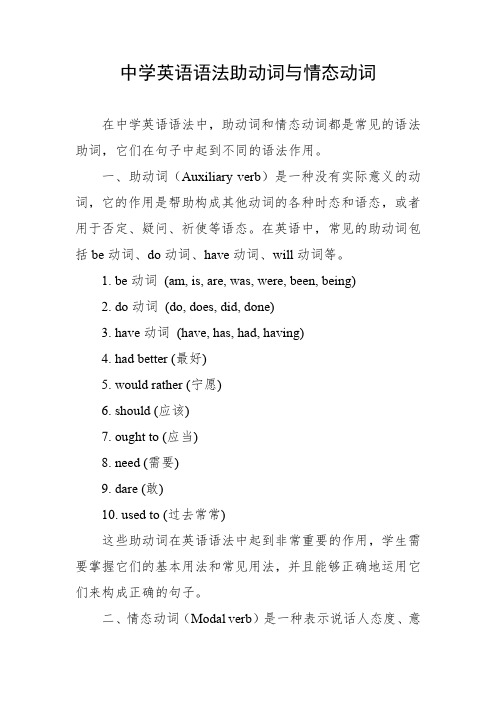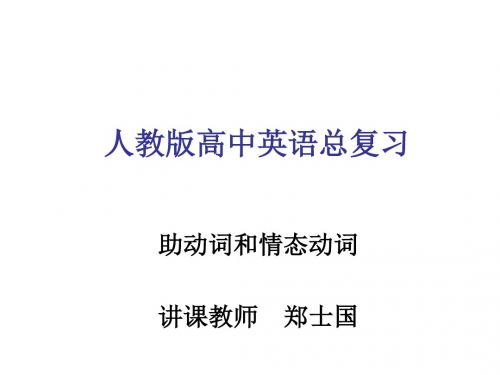英语语法:助动词、情态动词
中学英语语法助动词与情态动词

中学英语语法助动词与情态动词在中学英语语法中,助动词和情态动词都是常见的语法助词,它们在句子中起到不同的语法作用。
一、助动词(Auxiliary verb)是一种没有实际意义的动词,它的作用是帮助构成其他动词的各种时态和语态,或者用于否定、疑问、祈使等语态。
在英语中,常见的助动词包括be动词、do动词、have动词、will动词等。
1. be动词(am, is, are, was, were, been, being)2. do动词(do, does, did, done)3. have动词(have, has, had, having)4. had better (最好)5. would rather (宁愿)6. should (应该)7. ought to (应当)8. need (需要)9. dare (敢)10. used to (过去常常)这些助动词在英语语法中起到非常重要的作用,学生需要掌握它们的基本用法和常见用法,并且能够正确地运用它们来构成正确的句子。
二、情态动词(Modal verb)是一种表示说话人态度、意愿、推测、能力等的动词,它们通常用于表示说话人的主观态度或对某个行为的看法。
在英语中,常见的情态动词包括can、could、may、might、shall、should、will、would等。
情态动词是英语语法中的一类特殊动词,它们用于表达说话人的态度、意愿、推测、能力等。
情态动词通常不单独使用,而是和实义动词一起构成谓语动词,用于表达各种语态和时态。
以下是一些常见的英语语法情态动词:1. can (能够)2. could (过去能够)3. may (可能)4. might (可能)5. shall (将要)6. should (应该)7. will (将会)8. would (会)9. must (必须)10. need (需要)11. dare (敢)12. used to (过去常常)情态动词的使用可以表达说话人对某种情况或行为的看法、意愿、推测、能力等,因此在英语语法中非常重要。
高考英语助动词情态动词

时。
2) 构成完成进行时态:have + been + v-ing
3) 构成不定式等非谓语动词的完成式:have+p.p./ having+p.p.等。
3. do
1) 构成疑问/否定。
2) 用于强调动词:I did do it yesterday.
3) 用于代替上文中刚提及的动作,以避免重复:He lives here but I
人教版高中英语总复习
助动词和情态动词 讲课教师 郑士国
助动词和情态动词—用法决定词性
助动词和情态动词 均为辅助动词表达意义的动词。
1. 助动词用于表示人称、时态和语态
1) be, have, do
2) shall/should, will/would (兼做情态动词)
2. 情态动词 用于表明作者要赋予动词的情态意义。
1) must, may/might
2) shall/should, would, ought,
3) need, dare, have, used, be able, had better/had best
情态动词 准确把握句子的语气, 是正确使用情态动词的要点和难点。 无论是揣摩别人的语气,还是表达自己的语气,都需要清晰分辨语境中 情态动词的含义。
进行时。
3) 构成被动语态 be + p.p.
助动词—时态和语态的承载者
2
2. have
1) 构成完成时态:have + done
A. 当have为have/has时,与不同的人称和数的主语配合,构成现
在完成时。
B. 当have为had时,与不同的人称和数的主语配合,构成过去完成
第004章助动词和情态动词

第四章助动词和情态动词助动词和情态动词都是动词的不同形式,不能单独使用,通常和谓语中心词一起构成谓语动词的各种时态,语态及其他用法。
第一节助动词一、助动词的种类英语中的助动词有四种:(1)be(is, am, are, was, were, being, been )(2)have(has, had, having)(3)do(does, did)(4)shall, will(should, would)二、助动词的用法助动词本身没有独立的词义,不能单独构成谓语,通常和谓语动词连用表示时态、语态、语气或构成否定句和疑问句。
1、构成除一般现在时和一般过去时之外的各种时态。
例如:she is having a meeting.她在开会。
I shall help you any minute.我将随时帮助你。
I have been working in the company for years.我已在这个公司工作多年了。
They’ll discuss the problem tomorrow.他们明天将讨论这个问题。
Soon they would have reached their time limit and must return to the camp.不久规定的时间就要到了,他们就得回到营地。
He has written the paper.他的论文已经写完了。
They had finished the work before I arrived there.在我到那之前,他们已经把工作做完了。
2、构成被动语态。
助动词和过去分词连用可构成被动结构。
例如:The documents have not been signed by the manager.这些文件经理还没签字。
The machine was made in Japan.那部机器是日本造的。
Smith has been sent to California for a year.史密斯被派到加利福尼亚去一年。
助动词和情态动词

助动词和情态动词1.助动词和情态动词的定义:在英语中,助动词一般没有词义,主要帮助构成谓语,表示时态,语态,构成疑问及否定形式或加强语气。
情态动词与助动词不同,情态动词有意义,但它也和助动词一样,不能单独的作谓语,必须和其他动词一起构成谓语。
另外重要的一点是情态动词没有人称和数的变化,其后必须跟动词原形。
His brother does not like playing basketball .2.助动词和情态动词的种类1)助动词的种类①be(am ,is,are,was,were,been,being )助动词be与现在分词结合,可以构成进行时态;若它与过去分词结合,可以构成被动语态。
You are a reading . She was beaten by the boy .②have(has,had,having )助动词have 与过去分词结合,可以可以构成完成时态。
I have finished my college life. I had finished the middle school .③shall (should) ,will (would)助动词shall 和will 与动词结合,可以构成将来时。
we will be very happy to see you .④do (does,did)助动词do 与其他动词结合,可以构成否定句和疑问句。
I do not like this book . Does you buy this pen?3.情态动词的种类英语的的情态动词主要有can,could,may,might,must,have to ,will , would ,shall, should, ought to , had better ,need ,dare 等,用来表示请求,义务,劝告,推测,建议,征求对方意见或许可等。
Can ,may ,must 是三个重要的情态动词,它们的基本句型如下:肯定句:主语+can,may, must+动词原形+.....否定句:主语+can,may, must+not+动词原形+.....疑问句:Can , May , must+主语+动词原形+.....?Can 表示可能性,能力,许可等。
高考英语助动词情态动词

I shall write to you at the end of the month.
If you want a computer, you shall have one.
A player shall be sent off for using bad language. need
情态动词--明晰每一个情态动词的具体功能
4) 责任、义务,与should/ought含义类似:
You must see the film; it’s wonderful.
4. should /ought
1) 责任、义务
A. 指现在或将来:
The police should do something about it.
The machine ought to be cleaned once a week.
don’t.
助动词—时态和语态的承载者
3
4. will
1)表示将来,用于各个人称。
2)表示请求,用于第二人称的疑问形式:Will you have an apple?
5. would
1) 表示过去将来,用于各个人称。
2)表示婉转请求,用于第二人称的疑问形式:Would you help me?
1) must, may/might
2) shall/should, would, ought,
3) need, dare, have, used, be able, had better/had best
情态动词 准确把握句子的语气, 是正确使用情态动词的要点和难点。 无论是揣摩别人的语气,还是表达自己的语气,都需要清晰分辨语境中 情态动词的含义。
高中英语 语法复习十一 助动词与情态动词

语法复习十一:助动词与情态动词(一)助动词有be, have, do, will, shall。
它们本身没有词义,只和实义动词的一定形式构成复合谓语,用来表示时态和语态,构成否定、疑问及加强语气等。
1、be (am, is, are, were, been)(l)“be + -ing”构成进行时态;(2)“be + 过去分词”构成被动语态;(3)“be + 动词不定式”构成复合谓语:①表示按计划安排要发生的事。
The prime minister is to visit Japan next year. 总理将于明年访问日本。
②用于命令。
You're to do your homework before you watch TV.你得做完了作业才能看电视。
2、have (has, had)(1)“have+过去分词”构成完成时态。
如:Have you seen the film ? (2)“have been + -ing”构成完成进行时态。
如:What have you been doing these days? 这些日子你一直在干什么?3、do (does, did)(1)“do not + 动词原形”构成行为动词的否定式。
如:His brother doesn’t like playing basket.;(2)“Do + 主语 + 动词原形”构成行为动词的一般疑问句。
Does he go to school by bike every day? (3)“do + 动词原形”用于祈使句或陈述句中表示加强语气。
如:I did go to see him, but he wasn’t in我确实去看望他了,但他不在家。
Do do some work. 请一定做点什么;(4)代替前面刚出现的动词以避免重复。
My mother told me to go to bed early. So I did.4.will, shall (would, should)“will (shall+动词原形”构成一般将来时,一般来说shall用于第一人称,will用于第二人称或第三人称,口语中常用will代替shll,如:We will have a meeting to discuss the problem.(二)情态动词情态动词表示说话人对某一动作或状态的态度,可以表示“可能”、“可以”、“需要”、“必须”或“应当”等之意。
助动词与情态动词

3 用于加强语气,do, does和did位于陈述句的动词 原形前,do位于祈使句中的动词原形前。如:
Do have another cup of coffee before you go.
走前请一定再喝一杯咖啡。
如:
Never did I tell him about that.我从来没有告诉过 他那件事。
Rarely does it snow in the South.南方很少下雪。
情态动词can. may. must的用法
1. can的用法 2. could的用法 3. may的用法 4. might的用法 5. must的用法
May I ask you a question 我可以问你个问题吗 比Can I ask you a question
更礼貌
You may keep the book for two weeks. 这本书你可以借两周。 2 may表示可能性,常用于肯定句和否定句中,指
现在或将来的可能性。如: It may be true.那可能是真的。 The road may be blocked.这条路可能不通了。
You may as well stay where you are.你还是原地呆着好。 All the pubs are closing. We may as well go home. 所有的酒馆都打烊了。我们还是回家吧。
在对由may引出的“请求许可”的问句做出肯定回答时 了通常不用过于严肃和正式的Yes, you may. 而多用Yes, please 请便 或Of course/ Certainly 当然可以 ;否定回答 时,常用“Please don't 请不要 .”或“No, you mustn't 不行 .”
英语语法知识讲解:助动词和情态动词

英语语法知识讲解:助动词和情态动词
1.助动词:辅助其他动词构成时态、语态、疑问句式、否定名式的动词。
助动词有些词义,有些没有词义,或者暗含一点词义。
放在谓语首位置助动词会受主语人称、数的限制,其他位置不会受限制。
2.英语中有19个助动词:
do does did
shall will should would
have has had having
be am is are was were been being
3.情态动词:放在谓语动词的首位,辅助其他动词构成谓语,给谓语增加“可以,愿意,能够,应该,必须”等意思。
情态动词的性质、作用与助动词相同,除了给谓语增加一点意思外,还代替助动词与其他动词构成疑问句式和否定句式。
但它们没有人称、数的变化,并且只能用在谓语中,不能用于为以外的成分中。
4.英语的情诚动词有:
5.助动词和情态动词的对比:
本文作者:丹丹英语(公众号:英语语法学习)
英语语法知识讲解:助动词和情态动词1.助动词:辅助其他动词构成时态、语态、疑问句式、否定名式的动词。
助动词有些词义,有些没有词义,或者暗含一点词义。
放在谓语首位置助动词会受主语人称、数的限制,其他位置不会受限制。
2.英语中有19个助动词:do does did shall w 推荐度:点击下载文档文档为doc格式。
- 1、下载文档前请自行甄别文档内容的完整性,平台不提供额外的编辑、内容补充、找答案等附加服务。
- 2、"仅部分预览"的文档,不可在线预览部分如存在完整性等问题,可反馈申请退款(可完整预览的文档不适用该条件!)。
- 3、如文档侵犯您的权益,请联系客服反馈,我们会尽快为您处理(人工客服工作时间:9:00-18:30)。
英语语法:助动词、情态动词五.助动词和情态动词A.助动词:没有独立的词义,不能单独构成谓语,往往有形式变化:be (am, is, are, was, were, being, been), have (has, had, having), do (does, did), shall, will (should, would).1.构成一般现在时与一般过去时以外的各种时态;2.构成被动语态;3.构成否定句和疑问句;4.加强语气;5.替代,以避免重复;6。
构成虚拟语气。
5) I th ought she’d come, but she didn’t (=didn’t come).B.情态动词:有一定的词义,没有人称和数的变化,不能单独构成谓语,后接动词原形:can, could, may, might, will, shall, would, should, must, need, ought to, dare等。
1.can/ could:1)表能力;2)许可;3)可能性;4)推测(通常用于否定句或疑问句)1) She can drive, but she can’t ride a bike. My son could (=was able to) read and write when he was four. 但:He was able to pass his examination as a result of his hard study. (设法或成功做了某事)2) Students can’t smoke in t he classroom. I could borrow my father’s car whenever I liked.3) Even experienced teachers can make mistakes. (理论上的可能性)Our club finances may be improved. It could be better to stay here. (实际上的可能性)4) The story can’t be true. (现在或未来情况) He couldn’t have said such a thing. (过去情况) 2.may/ might:1)可能性、推测;2)许可(否定:may not, m ustn’t);3)委婉的责备、不满;4)目的、让步状语从句;5)固定搭配:may (might) as well, may well;6)表祝愿(倒装)1) They might have known the matter earlier. (过去的推测)I think it might rain. It may snow tomorrow. He may be having the meeting now. (现在或未来的推测)2) You may use my dictionary. My boss told me I might havea vacation.3) You might have told the truth. (对照虚拟语气中的类似句式)4) They moved over a little so that I might sit down. Whatever he might say, no one believed him,.6) May you have merry Christmas!3.must:1)义务(否定:need n’t);2)不允许(否定句中);3)推测1) — Must I wash the dishes at once? — Yes, you must. / No, you needn’t.2) You must not speak ill of others.3) It must rain soon. He must be having the meeting now. (对现在或未来进行“肯定”猜测)No one answered the phone bell. They must have gone out. (对过去已发生的情况进行“肯定”猜测)4.need:1)需要;2)needn’t have + 过去分词(过去做了不必要做的事情);3)实义动词1) You needn’t work so hard.You need not meet him unless you’d like to.2) You needn’t have bought the dress. 3) You don’t nee d to come if you feel sick.5。
dare:1)敢;2)实义动词1) Mary dare not touch the snake. 2) I have never dared to tell him about it.6.will/ would:1)时态的区别;2)语气的区别1) I will marry you whatever happens. His father was angrybecause he wouldn’t obey him.2) Will you pass me the salt, please? Would you like to come and join us at the party?7.shall/ should/ ought to:1)第一、三人称疑问句,表示征求同意;2)第二、三人才陈述句,表示义务、命令,许诺;3)should/ ought to +动词原形:义务;4)should/ ought to +现在完成式,表责备、后悔(该做而没做的事)1) Shall I fetch a doctor for you? Shall he come at once?2) You shall do as you see me do. They shall never interfere in my private affairs again.3) You don’t look well. You ought to go to see the doctor. You should apologize to him.4) He shouldn’t have said such a thing. You ought to have worked harde r.8.would (会), should (应该), might (可能), ought to (应该) 用于虚拟语气(参见“虚拟语气”部分)1. Not until the game had begun ________ at the sports ground. (2000.6)A. had he arrivedB. did he arriveC. would he have arrivedD. should he have arrived2. Investigators agreed that passengers on the airliner _______ at the very moment of the crash. (2002.6)A. should have diedB. must have diedC. must be dyingD. ought to die3. The careless man received a ticket for speeding. He _______ have driven so fast. (2002.12)A. can’tB. wouldn’tC. shouldn’tD. mustn’t4. While crossing the mountain area, all the men carried guns lest they ____ by wild animals. (2002.12)A. should be attackedB. had been attackedC. must be attackedD. would be attacked5. He said that the driver must have had an accident; otherwise he ________ by then. (2002.12)A. would have arrivedB. should arriveC. must have arrivedD. would arrive6. The boy spent as much time watching TV as he ________ studying. (2002.1)A. doesB. hadC. wasD. did7. Things might have been much worse if the mother ________ on her right to keep the baby. (2002.1)A. has been insistingB. had insistedC. would insistD. insisted8. By the time you get New York, I _________ for London. (2002.1)A. would be leavingB. am leavingC. have already leftD. shall have left9. The article suggests that when a person ______ under unusual stress he should be especially careful to have a well-balanced diet. (2002.1)A. isB. wereC. beD. was10. By the time he arrives in Beijing, we ________ here for two days. (2001.6)A. have been stayingB. have stayedC. shall stayD. will have stayed11. You _________ him so closely; you should have kept your distance. (2000.6)A. sh ouldn’t followB. couldn’t have been followingC. mustn’t fol lowD. shouldn’t have been following12. Some woman _______ a good salary in a job instead of staying home, but they decided not to work for thesake of the family. (2000.1)A. must makeB. should have madeC. would makeD. could have made13. As Commander-in-Chief of the armed forces, I have directed that all measure ________ for our defense.(1999.6)A. had been takenB. would be takenC. be takenD. to be taken14. I have often ________ that you country is very beautiful.A. heard to tellB. heard to be toldC. heard to have toldD. heard tell15. With all this work on hand, he ________ to the cinema last night.A. mustn’t goB. wouldn’t goC. oughtn’t toD. shouldn’t have gone16. You ______ all these calculations! We have a computer to do that sort of thing.A. needn’t have doneB. must not have doneC. shouldn’t have doneD. cannot have done17. Mr. Brown was concerned that his unpopular political position _______ a disastrous effect on his career.A. could beB. might haveC. have beenD. shall be18. He _________ at the party but I didn’t notice him there.A. must have beenB. may have beenC. would have beenD. must be19. This box is too heavy. _________ give me a hand? (1998.1)A. would you mindB. would you pleaseC. will you like toD. will you please to20. As teacher we should concern ourselves with what is said, not what we think _______. (1997.6)A. ought to be saidB. must sayC. have to be saidD. need to say21. Once environmental damage ________, it takes many years for the system to recover. (1997.6)A. has doneB. is to doC. doesD. is done。
